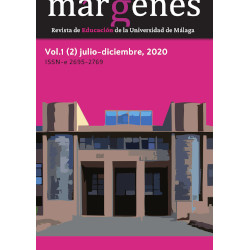The Role of Transferable Skills and Experiential Learning in English Teaching Training
DOI:
https://doi.org/10.24310/mgnmar.v1i2.8624Keywords:
transferable skills, experiential learning, higher educationAbstract
Globalization, technology, social insecurity, information era and human diversity are socio-historical changes in which the latest generation of university students have been raised. Among the foundational responsibilities of higher education lies the need to be aware of those challenges and their implications for students’ academic education. Ignoring the consequences of those changes may leave a gap that could translate formal education into a mere theoretical unconnected process. This article presents findings from a multiple case study that analyzes the role of transferable skills in higher education and the impact of experiential learning in the development of these skills. Findings include the experiences of students and teachers who recorded challenges, successes and failures regarding the development of skills such as effective communication, social skills, management of emotions, decision-making, work ethics and time management in their program. From this study, there is a call for: establishing a common definition that unifies the conceptualization of transferable skills, identifying the required skills for teacher education programs and other specializations and providing a direction towards explicit instruction of transferable skills in higher education programs.
Downloads
Metrics
Publication Facts
Reviewer profiles N/A
Author statements
Indexed in
-
—
- Academic society
- N/A
- Publisher
- Universidad de Málaga
References
Barrantes-Elizondo, L. (January- June 2016). Universitarios con conciencia social y humanista: El caso Team-UNA. Universidad en Diálogo, 6(1), 95-109. http://dx.doi.org/10.15359/udre.6-1.6
Barrantes-Elizondo, L., Valverde-Marín, E. & Quesada-Estrada, E. (2018). La integración de la extensión, la docencia y la investigación universitarias: El caso del Proyecto Team-UNA de la Sede Regional Brunca. Universidad en Diálogo, 8(1), 73-84. https://doi.org/10.15359/udre.8-1.5
Bloomberg, L. & Volpe, M. (2016). Completing your qualitative dissertation: A road map from beginning to end. SAGE.
Cinque, M. (2016). “Lost in translation”. Soft skills development in European countries. Tuning Journal for Higher Education, 3(2), 389-427. doi:http://dx.doi.org/10.18543/tjhe-3(2)-2016pp389-427
Dewey, J. (1950). Las escuelas del mañana. Losada.
Guerra-Báez, S.P. (2019). Una revisión panorámica al entrenamiento de las habilidades blandas en estudiantes universitarios. Psicología Escolar e Educacional, 23. https://dx.doi.org/10.1590/2175-35392019016464
Herrera, R. (2017). Aprendizaje basado en proyectos colaborativos de entornos de programación a partir de proyectos de ingeniería civil. Revista Electrónica Educare, 21(2), 1-18. https://doi.org/10.15359/ree.21-2.10
James, W. (1910). The Works of William James. En Mónica, Aguerri (Ed. y Trad.), El equivalente moral de la guerra. Recuperado de http://www.unav.es/gep/TheMoralEquivalentOfWar.html
Kolb, D. (1984). Experiential learning: Experience as the source of learning and development. Englewood Cliffs, NJ: Prentice-Hall.
Martínez, J. A. (2011). La empleabilidad: Una competencia personal y una responsabilidad social. Contribuciones a las Ciencias Sociales. Recuperado de http://www.eumed.net/rev/cccss/15/jamg.html
Merriam, S. (2002). Qualitative research in practice. San Francisco: Jossey Bass
Mills, A. J., Durepos, G., & Wiebe, E. (2010). Encyclopedia of case study research (Vols. 1-0). Thousand SAGE Publications, Inc. https://doi.org/10.4135/9781412957397
Ramón, R. (2013). Las teorias de Schön y Dewey: hacia un modelo de reflexión en la práctica docente. CINZONTLE, 23, pp. 27-32.
Saldaña, J. (2016). The coding manual for qualitative researchers. SAGE.
Schön, D. (1983) The reflective practitioner: how professionals think in action. Basic Books.
Schön, D. (2002). La formación de profesionales reflexivos: hacia un nuevo diseño de la enseñanza y el aprendizaje en las profesiones. Paidós.
Slaughter, S., Leslie, L.L. (2001). Expanding and elaborating the concept of academic capitalism. Organization, 8(2), 154-161. https://doi.org/10.1177/1350508401082003
Tulgan, B. (2015). Bridging the soft skills gap: How to teach the missing basics to today’s young talent. John Wiley & Sons.
Vera, F. (2016). Infusión de habilidades blandas en el currículo de la educación superior: Clave para el desarrollo de capital humano avanzado. Revista Akademèia, 7(1), 53-73
Yin, R. K. (2002). Case study research: Design and methods (Applied Social Research Methods, Vol. 5) (3rd ed.). SAGE.
Downloads
Published
How to Cite
Issue
Section
License
The editorial team of Márgenes supports an open Access policy of scientific knowledge. apostamos claramente por una política de acceso abierto del conocimiento científico (see Berlin Declaration).
Authors with work published in this journal accept the following conditions:
- This journal provides immediate free access to its content under the principle of making research freely available to the public. All contents published in Márgenes are subject to the Creative Commons Reconocimiento-SinObraDerivada 4.0 Internacional
It is the responsibility of the authors to obtain the necessary permissions of the images that are subject to copyright.
Authors whose contributions are accepted for publication in this journal will retain the non-exclusive right to use their contributions for academic, research and educational purposes, including self-archiving or deposit in open-access repositories of any kind.
The electronic edition of this magazine is edited by the Editorial of the University of Malaga (UmaEditorial), being necessary to cite the origin in any partial or total reproduction.
- Authors can enter into other additional independent contractual agreements for the non-exclusive distribution of the version of the article published in this journal (e.g. including it in an institutional repository or publishing it in a book) on the condition that they clearly indicate that the work was originally published in this journal.
- Authors are allowed and recommended to publish their work on the Internet (for example on institutional and personal websites), before and after the publication, as this could lead to constructive exchanges and a more extensive and quick circulation of published works (see The Effect of Open Access).















